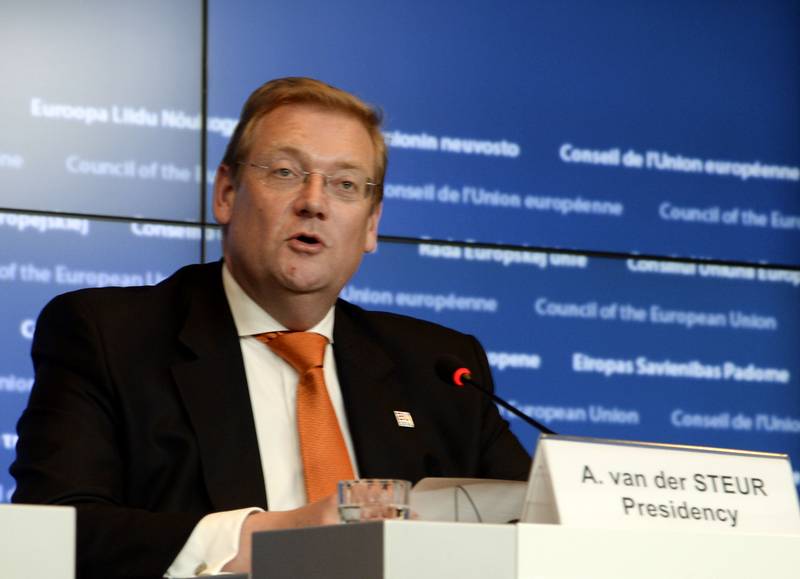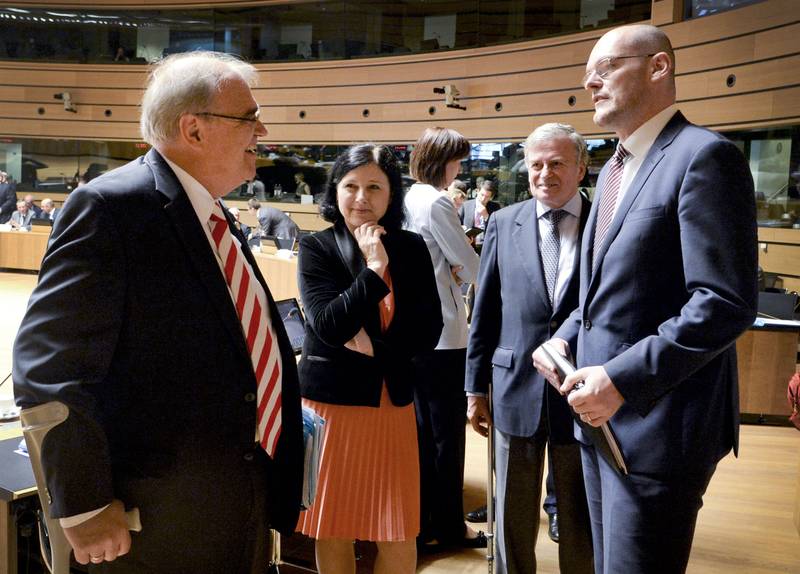Commission Was Completely Ignored by Council on EPPO
Adelina Marini, June 15, 2016
 The intergovernmental approach is winning in the creation of a regulation on the establishment of an European Public Prosecutor’s Office (EPPO), which would investigate crimes against the EU’s financial interests. Work on the project has turned in a Eurosceptic direction from the very beginning. The battle between those, who want a strong supranational institution, and those, demanding that national authorities have priority ended with victory for the latter. There is an agreement already on most of the huge regulation, so the European prosecution could be approved by the end of the year. It will not be the powerful supranational body the European Commission dreamt of when presenting the draft regulation. Moreover, there is no more tolerance for the Commission’s criticism. This became clear during the negotiations on the next in line updated draft at the Council of justice ministers last week.
The intergovernmental approach is winning in the creation of a regulation on the establishment of an European Public Prosecutor’s Office (EPPO), which would investigate crimes against the EU’s financial interests. Work on the project has turned in a Eurosceptic direction from the very beginning. The battle between those, who want a strong supranational institution, and those, demanding that national authorities have priority ended with victory for the latter. There is an agreement already on most of the huge regulation, so the European prosecution could be approved by the end of the year. It will not be the powerful supranational body the European Commission dreamt of when presenting the draft regulation. Moreover, there is no more tolerance for the Commission’s criticism. This became clear during the negotiations on the next in line updated draft at the Council of justice ministers last week.
At it, Dutch Justice Minister Adriaan van der Steur cut off Justice Commissioner Věra Jourová (Czech Republic, ALDE) with the words that he was fully aware that the ambition of the Commission is impossible to reach at this point. “On the other hand, I clearly heard that you fully support the compromises reached and I thank you for that”, said the minister after Commissioner Jourová made a long speech, which did start with a commendation for the Dutch presidency for achieving considerable progress in the negotiations. She expressed her conviction that thanks to this progress the entire regulation could be finalised by the end of the year. “I welcome the package you submitted”, said the Czech Commissioner, but later reminded that that what the EU needed is a “strong, efficient and independent EPPO”, which requires that the text be balanced. “The text that you have presented is a good basis but, in my opinion, still lacks the necessary balance”.
Ministers concentrated their efforts on June 9th on three main subjects – the EPPO's case management system, data protection regime, and simplified prosecution procedures. Unlike previous instances, the Justice Commissioner found herself completely isolated this time, after ministers, despite having some reservations, welcomed progress made and expressed willingness to finally put an end to this dossier after three years spent working on it. And Ms Jourová’s problem is not negligible at all. She expressed concern that the so proposed case management system is still ambiguous regarding case files. She feels it is absolutely inadmissible to have duplicate case files – one national and one in the EPPO. A single case is needed, which belongs in the EPPO, she stated. The Commissioner also feels it is absurd access to EPPO case files be regulated by national law.
Věra Jourová addressed strong criticism at personal data protection regulations, which make up a sizable portion of the huge draft regulation (over 80 pages long). The Commission is also outraged by the fact that within the draft regulation the Council sets up its own data protection system, instead of using the existing EU Regulation 45/2001, which, Ms Jourová believes, is fully applicable in the case of the EPPO as well. “This approach raises doubts about its legal soundness”, explained the Commissioner and warned that this way European law gets unnecessarily duplicated. Moreover, the draft regulation in its current form does not take into account current data protection changes in European law. Věra Jourová insisted that the texts, proposed by the Presidency, be only a temporary solution, which will be immediately replaced as soon as the data protection regulation reform is in full force.
The Commissioner expressed her bewilderment at the texts on simplified prosecution procedures. “I regret that this provision lacks a minimum degree of European dimension. It creates an optional, a la carte system, only based on different national laws on those member states which have such simplified procedure”. According to the Commissioner, this could lead to unpredictable results. Her words, however, remained unheard. After being completely ignored by the presiding Van der Steur, Věra Jourová received almost no support at all. German Minister of Justice and Consumer Protection Heiko Maas expressed his uninhibited satisfaction with the proposed compromise. “It's splendid”, he said. “We support the proposed concept and very often we can support the specific language”, he added, for the purpose of the public discussion was not going into detail, but rather approving the text’s concept.
Germany has its reserves on various provisions, but believes they are of a type that can be resolved at the technical level. “EPPO must respect the criminal procedures of member states” and “It is very important for us that EPPO must apply national procedural laws” were among the statements of Minister Maas, which clearly showed Commissioner Jourová that she has lost this battle. Support for the presidency came from French Justice Minister Jean-Jacques Urvoas, who believes it is high time that work on this draft regulation, which has been going on for three years already, be completed. “France would like to support the presidency”, he said. France has some comments, but in general Paris approves of the proposed regulation.
“Most of us have many regrets with regard to the compromise reached but in order to have a broaden support we should bury most of our regrets”, added Belgian Justice Minister Koen Geens, who was among the strong voices in support of a strong supranational prosecution. “The price for this consensus has been very high for Spain”, said Spanish State Secretary for Justice Carmen Sánchez-Cortés Martín and pointed out there are risks regarding data protection and the administration of the use of such data. Several member states (Hungary, Slovenia, and Belgium) united around the Portuguese idea that a third party be appointed with the supervision, unlike regulation’s provision for a European data protection officer. As Portuguese Minister of Justice Francisca Van Dunem explained, European supervision has no expertise and will not be independent enough to implement these functions.
Ekaterina Zaharieva, minister of justice of Bulgaria, also supported the presidency’s texts, but expressed hope that further on, on the expert level, “more precise definitions” will be found on some of them. Bulgaria, too, was among countries supporting a more centralised approach. All of them – some with reserves, some without – supported the compromising text of the Dutch presidency, with the exception of Poland. Polish Undersecretary of State for Justice Łukasz Piebiak stated that Warsaw cannot accept the proposal. The country has a problem with criminal proceedings and data protection. “Our prosecutors, when they see it they can’t believe it’s been drafted in this form, because these provisions will not guarantee good provisions, good prosecution and there is the whole question of access to very sensitive data in our registration system even in cases which are not linked to financial interests”, said the Polish official. Poland also believes there is no satisfactory  resolution of the investigations expenses issue, which was subject to the previous Council discussion in March.
resolution of the investigations expenses issue, which was subject to the previous Council discussion in March.
Hungary mellowed down its position by stating that, although Constitutional changes are necessary because of the prosecutors' responsibilities, the subject is already on the country’s agenda. Support for the compromising version came even from Italian Justice Minister Andrea Orlando, who made passionate speeches at previous meetings in support of a powerful, supranational prosecution, which would have even more powers than simply investigating crimes connected with the EU’s financial interests. He insisted the EPPO also dealt with organised crime in general. On June 9, however, he stated that the proposed text is acceptable. He reminded that regarding the simplification of criminal proceedings Italy insisted on a more ambitious text and more unified procedures. Italy continues to have “a fundamental reservation” on the basic setup of the EPPO, but it seems like Rome is prepared to compromise.
Work on the EPPO will continue under the Slovak presidency. At this stage, however, it looks like member states have totally distanced themselves from the initial proposal of the EC and are no longer even inclined to listen to its argumentation.
Translated by Stanimir Stoev
 Federica Mogherini | © Council of the EU
Federica Mogherini | © Council of the EU | © Council of the EU
| © Council of the EU Luis De Guindos | © Council of the EU
Luis De Guindos | © Council of the EU